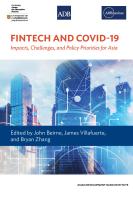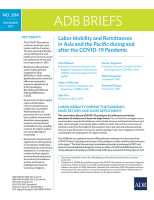Unlocking ASEAN’s Digital Economy Entails Embracing Trustworthy and Inclusive Payments Systems

Research Associate, Economic Research Institute for ASEAN and East Asia (ERIA)

Research Associate, Economic Research Institute for ASEAN and East Asia (ERIA)

ASEAN is witnessing a significant surge in the adoption of digital payments, such as mobile wallets, virtual credit cards, and wire transfers. Photo credit: iStock/Kanawa_Studio.
This entails bridging the digital divide, improving the digital skills and literacy of citizens, and safeguarding payments systems from cybersecurity risks.
This article is published in collaboration with the Economic Research Institute for ASEAN and East Asia.
The ASEAN region, along with the rest of the world, has experienced a significant acceleration in adopting digital technologies in the wake of the COVID-19 pandemic. According to the e-Conomy SEA report by Google, Temasek, and Bain & Company, Southeast Asia's digital economy surpassed $200 billion in gross merchandise value in 2022, with digital adoption continuing to rise post-pandemic. Among the key sectors driving the growth of the digital economy in the region are e-commerce, transportation and food, online travel, online media, and financial services. In this op-ed, we will focus specifically on the digitalization of financial services, as embracing digital payments holds the key to unlocking ASEAN's digital economy by increasing efficiency, productivity, reducing costs, and fostering regional economic integration.
One notable area of digital transformation in the financial services sector in ASEAN is the rise and revolution of digital payments. The surge in online transactions in e-commerce, coupled with limited physical interactions during the pandemic, has led to an increased adoption of digital payments, with gross transactions value exceeding $800 billion in 2022. This shift from offline to online consumer behavior has prompted fintech players and platforms, including digital banks (digibanks), traditional banks, and insurance companies, to extensively digitize their services in order to keep pace with evolving trends.
ASEAN is witnessing a significant surge in the adoption of digital payments, such as mobile wallets, virtual credit cards, and wire transfers. According to a 2021 Bloomberg report, ASEAN holds the fastest-growing mobile wallet market globally. The growth of cross-border trade in the past decade has also fueled the adoption of digital payments. Traditionally, cross-border transactions have been associated with high costs and lengthy processing times. However, digital payments have emerged as a convenient and efficient solution to overcome these obstacles.
Robust digital infrastructure is key
The rise of digital payments brings attention to the importance of robust digital infrastructure. Modern networks, hardware, software, data centers, and broadband connectivity are essential for seamless digital service delivery and the growth of digital payments in ASEAN. Improving digital infrastructure is a crucial factor in advancing ASEAN's digital economy. Therefore, it is imperative for ASEAN to prioritize and increase efforts to improve accessibility and affordability of data connections and devices across the region.
ASEAN is also demonstrating its commitment to establishing effective data governance practices in the region. Frameworks such as the Bandar Seri Begawan Roadmap, the ASEAN Digital Master Plan 2025, the ASEAN Framework on Digital Data Governance, and the ASEAN Digital Integration Framework highlight the region's focus on the digital economy. However, discrepancies in data governance frameworks among ASEAN member states still exist. A coherent and standardized data governance framework applicable to all members would facilitate smooth and secure data flow across national borders, reducing these discrepancies.
The growth of digital payments in ASEAN has brought to light several challenges both within and between countries. Digital development disparities among and within member states, as well as concerns about privacy and cybersecurity, are the primary obstacles for digital transformation in the region. The success of digital banking and digital payments also depends on addressing the issue of unbanked populations. The share of unbanked population varies among the six ASEAN countries, with Singapore having the lowest (12%) and Indonesia the highest (81%) unbanked population. This highlights the significant digital divide in the region.
A case for compatible payments systems
The increasing prominence of digital payment systems raises questions about their compatibility across the region. An inclusive and region-wide digital payment system would facilitate financial transactions and deepen regional integration in the financial sector.
Five ASEAN central banks—Bank Indonesia, Bank Negara Malaysia, Bangko Sentral ng Pilipinas, Monetary Authority of Singapore, and Bank of Thailand—have signed an agreement on cross-border payment systems to promote connectivity and interoperability among countries. Moreover, several central banks in ASEAN have launched bilateral QR-code-based cross-border payment systems, such as those between Indonesia and Thailand.
To promote the use of digital payments systems, ASEAN member states need to address specific challenges. First, while recognizing the importance of digital payments in supporting seamless cross-border digital trade, ASEAN should continue to address digital divide challenges, including disparities in digital development capabilities among countries and the gap in internet quality and usage. Second, countries should enhance digital knowledge and skills among their people through collaborations between governments, private sectors, and educational institutions. Promoting a culture of inclusiveness, innovation, and adaptability in embracing digital technologies and transformation is crucial. Digital literacy and skill development, particularly in rural or remote areas, will contribute to creating a better and more inclusive digital landscape in ASEAN. Finally, to ensure secure and free data flow within the region, ASEAN must build regional digital trust and ensure the implementation of high-security digital payment systems to prevent cybersecurity risks and data breaches.
This opinion piece has been published by The Manila Times and Khmer Times.

Ivana Markus
Research Associate, Economic Research Institute for ASEAN and East Asia (ERIA)Ivana Markus joined ERIA in January 2022. Prior to joining ERIA, she was part of the strategy and planning team at Grab Indonesia, involved in infrastructure-related projects in West Indonesia. She holds a bachelor's degree in Economics from Universitas Indonesia with concentration on development and labor economics.

Livia Feliciani Nazara
Research Associate, Economic Research Institute for ASEAN and East Asia (ERIA)Livia Feliciani Nazara joined ERIA in December 2022. She has a double degree in Economics from the Tilburg School of Economics & Management and Universitas Indonesia.

ERIA (Economic Research Institute for ASEAN and East Asia)
ERIA is an international organization that was established in 2008 by an agreement of the leaders of 16 East Asia Summit (EAS) member countries. Its main role is to conduct research and policy analyses to facilitate ASEAN Economic Community (AEC) building and to support wider regional community building.

